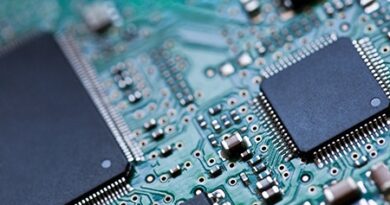J2 và HKSTP thành lập nhà máy cacbua silic đầu tiên ở Hồng Kông
News: Microelectronics
17 October 2023
The Hong Kong Science and Technology Parks Corporation (HKSTP) has signed a memorandum of understanding (MoU) with mainland China-based J2 Semiconductor (Shanghai) Co Ltd to establish a global R&D Centre focusing on third-generation semiconductors at the Hong Kong Science Park, and to set up Hong Kong’s first silicon carbide (SiC) 8-inch wafer fab.
The collaboration is jointly supported by the Innovation, Technology and Industry Bureau and the Office for Attracting Strategic Enterprises (OASES) with a view to sustain Hong Kong’s innovation and technology ecosystem and promote new industrialization. HKSTP’s CEO Albert Wong and J2 Semiconductor’s co-CEO TY Chu formally signed the MoU, witnessed by bureau secretary professor Sun Dong; OASES director-general Philip Yung; Ms Lillian Cheong, Under Secretary for Innovation, Technology and Industry; HKSTP’s chairman Dr Sunny Chai; and J2 Semiconductor’s chairman Dr Robert Tsu.
416656-Photo_1_3_.jpg.jpg
Witnessed by professor Sun Dong, Secretary of Innovation, Technology and Industry Bureau (last row, middle), Philip Yung, general director of OASES (last row, first from left), Ms Lillian Cheong, Under Secretary for Innovation, Technology and Industry (last row, first from right), Dr Sunny Chai, chairman of HKSTP (last row, second from left), Dr Robert Tsu, Chairman of J2 Semiconductor (last row, second from right), Albert Wong, CEO of HKSTP (first row, left) and TY Chu, co-CEO of J2 Semiconductor (first row, right) sign the MoU.
“ J2 Semiconductor is proactively building up the capacity, quality and competitiveness of Hong Kong’s tech talent pool,” says professor Sun Dong, Secretary for Innovation, Technology and Industry. “The project will also drive the development of related industries, including semiconductor equipment manufacturers, material suppliers, testing service providers, to develop a complete ecosystem to reinforce Hong Kong’s position in the global semiconductor industry value chain,” he believes.
“The plan of establishing J2 Semiconductor’s R&D Centre in the Science Park will promote Hong Kong’s R&D and advanced manufacturing capabilities of third-generation semiconductor devices,” says HKSTP’s chairman Dr Sunny Chai. “ J2 Semiconductor brings the core technology and expertise to Hong Kong in advanced chip design, fabrication process and semiconductor product development, which is an important milestone in the development of microelectronics industry in Hong Kong. As one of Hong Kong’s flagship innovation and technology platforms, we provide high-quality infrastructure and facilities as well as a vast network of partners, which will continue to promote Hong Kong’s microelectronics R&D capabilities and strengthen Hong Kong’s position as an international I&T hub,” he adds.
J2 Semiconductor will invest an estimated HK$6.9bn into the project, with plans to start volume production in the next couple of years. The targeted annual production capacity of 240,000 SiC wafers in 2028 should generate more than HK$11bn annually and create more than 700 jobs in Hong Kong. “The project will assist in the early completion of the localization of the new energy vehicle supply chain and drive the long-term development and prosperity of the semiconductor industry in Hong Kong,” reckons the firm’s chairman Dr Robert Tsu.
J2 Semiconductor aims to meet the strong demand for domestically produced automotive chips from the China automotive industry. It mainly provides high-performance silicon carbide devices focused on automotive, power conversion and communications. J2 Semiconductor says that its SiC technology can be applied to applications such as electric vehicles, as well as related infrastructure such as charging stations, smart grids and energy storage.
Aiming to build an ecosystem that now involves more than 200 microelectronics-related companies, HKSTP has established an extensive network of microelectronics hardware infrastructure, including the Sensor Packaging and Integration Laboratory (Sensor Lab), Heterogenous Integration Lab (HI Lab) and the Hardware Lab, which can support the end-to-end process of design, prototyping and pilot production of chip-related equipment and systems as well as products. The Microelectronics Centre in Yuen Long Innovation Park is set to begin operation in 2024, supporting HKSTP’s infrastructure to accelerate microelectronics R&D pilot production, creating opportunities for upstream and downstream enterprises in the industry chain.
The establishment of the J2 Semiconductor facilities in Hong Kong is expected to create a greater level of synergy and knowledge exchange. Currently, five universities in Hong Kong are ranked among the top 100 universities in the world, with more than 100 university researchers engaged in microelectronics research. In this year’s Budget Speech, the HKSAR Government announced its plan to establish a Microelectronics Research and Development Institute to strengthen collaboration with universities, R&D centers and companies in the industry, and further accelerate the ‘1 to N’ translation of R&D outcomes and bolster industry development.

